Gain essential insights into the SQE2 exam, along with expert tips and strategies from a specialist SQE2 training provider. Having successfully assisted over three hundred candidates, we offer you a unique perspective on navigating the exam effectively.
The Solicitors Qualifying Examination (SQE) is now a reality, and while it may be challenging, it promises greater accessibility and less dependency on training contracts. If you’re a law or non-law graduate interested in the SQE, join us for today’s brief talk on Stage 2. You can find more information about our specialised SQE2 preparation and the Academy’s unique approach to the second SQE exam. Our methods for preparing candidates differ significantly from other providers – perhaps even drastically -ensuring a tailored and effective learning experience.
This article aims to clarify SQE2 specifics and show how real-time one-to-one mocks with the Academy of Smart Lawyers can boost your preparation.
Additionally, we offer personalised consultancy on SQE2 exemptions to help you navigate your path to qualification. Learn more about our tailored support by reading further here.
No matter if you’re studying for SQE1 or SQE2, our expert resources are designed to support you throughout your preparation:
SQE 2 exam methodology
SQE stage 2 is a unique practical legal skills assessment adapted from medical education. At its core is the use of standardised clients and standard work practices aimed at testing the legal professionals’ ability to perform the roles and tasks required in their job. As a tool for testing health care professionals, the methodology involved in SQE two has been used in the UK and most of the US and Canadian medical schools since 1975.
In the legal domain, this mode of assessment allows testing much more than the aspiring solicitors’ functioning legal knowledge – which is the focus in SQE 1 with its multiple choice questions. Being a reliable, valid and objective assessment tool, SQE 2 exam seeks to evaluate their competence, as well as major practical skills needed for a successful legal career: those of effective communication, problem-solving and decision-making. This is why SQE2 preparation should be structured around skills. However, the law is also very important in SQE2 preparation and is assessed very much in-depth, as aspiring solicitors must provide legal advice on the spot.
Research into a simulation-based skills assessment proves it to be not only more objective compared to traditional assessment methods, but also less likely to cause test anxiety in students.
SQE 2 assessment structure
As SQE 2 exam is designed to assess candidates’ core legal skills – both oral and written – it is logically split into two parts. This two-stage design of the superexam was tested in the SQE 2 pilot assessments held in December 2019. Based on their findings, the model of assessment used for SQE pilot stage 2 has proved suitable for the purposes of the live SQE 2. The organisation and delivery of SQE 2 is outlined in the SRA’s SQE 2 assessment specification posted on 14 October 2020.
SQE 2 oral
SQE 2 oral part uses oral simulations in order to test the aspiring solicitor’s performance in two activities (called stations):
- client interview followed by an attendance note with legal analysis of the issues raised by the client (in 2 contexts: Property Practice, and Wills and Intestacy, Probate Administration and Practice)
- advocacy (in 2 contexts: Dispute Resolution, and Criminal Litigation).
The biggest challenge in both oral SQE 2 assessments is their interactive character: you have to find your way with a mock client played by an actor in an interview, and with a judge played by a solicitor of England and Wales in an advocacy session.
Another challenge here is timing. The task in a SQE 2 mock advocacy station – delivering a piece of courtroom advocacy to a judge present in the room – must be carried out within 15 minutes. Before starting their submission to the judge, aspiring solicitors have 45 minutes to study the file of documents available in the case. In a mock interview, searching for information provided to the client, taking basic interview notes, and outlining next steps available to the client, must all be completed within 25 minutes.
Based on the information obtained during the client interview, the SQE candidate is required to produce a handwritten attendance note/legal analysis. Here, the elements to be included are:
- analysis of legal issues identified by the partner in the email and by the client in the mock interview
- initial advice for the client
- appropriate next steps.

You can practise all of the SQE2 assessments above within our SQE 2 preparation.
Our experienced interviewers with academic background will call you to conduct real-time online client interviews based on realistic scenarios, mark your performance by the superexam criteria, and provide personalised analysis.
Following the interview, we offer two follow-up activities to let you improve your skill of writing an attendance note. Option One is to submit your handwritten attendance note and have it individually marked by one of our qualified solicitors. Option Two is to opt for a model answer from us to show you how the case could be analysed in the attendance note. Here you can read more about our approach to the SQE2 mock exams with personal tutors.
In an advocacy session, you will first receive a task with a bundle of documents to consider before the oral mock. In the advocacy mock itself, you will have a real-time online session with one of our qualified solicitors of England and Wales. After your delivery, the tutoring solicitor will assess your performance against the SQE2 criteria from the SRA, identify gaps in your knowledge, and offer personalised feedback and analysis. Watch the video below for more insights into SQE 2 preparation.
SQE 2 written
As set out in the SRA’s assessment specification above, in SQE 2 written part, an aspiring solicitor completes four stations based on written simulations and conducted over 3 days:
- case and matter analysis
- legal research
- legal writing
- legal drafting
Each day, the same four stations above are conducted in different practice contexts (practice areas):
- Day 1: 2 stations in Dispute resolution, and 2 stations in Criminal litigation
- Day 2: 2 stations in Property practice, and 2 stations in Wills and intestacy, Probate administration and practice
- Day 3: all 4 stations in Business organisations, rules and procedures.
All written SQE 2 assessments are computer-based, so a decent typing speed and the knowledge of how to save time with shortcuts cannot be stressed enough.
The tasks set for this stage of the Solicitors Qualifying Examination are as follows:




All four of the SQE2 written stations are covered by our SQE 2 programme, in particular individually conducted mocks. Your submissions for SQE Two legal writing, legal research and legal drafting are individually marked by solicitors, with their feedback delivered to you in writing. As for one-to-one mocks in case and matter analysis, these are a mix of your written submission and then an oral real-time session with your tutoring solicitor to discuss the task-related issues.
SQE 2 timing
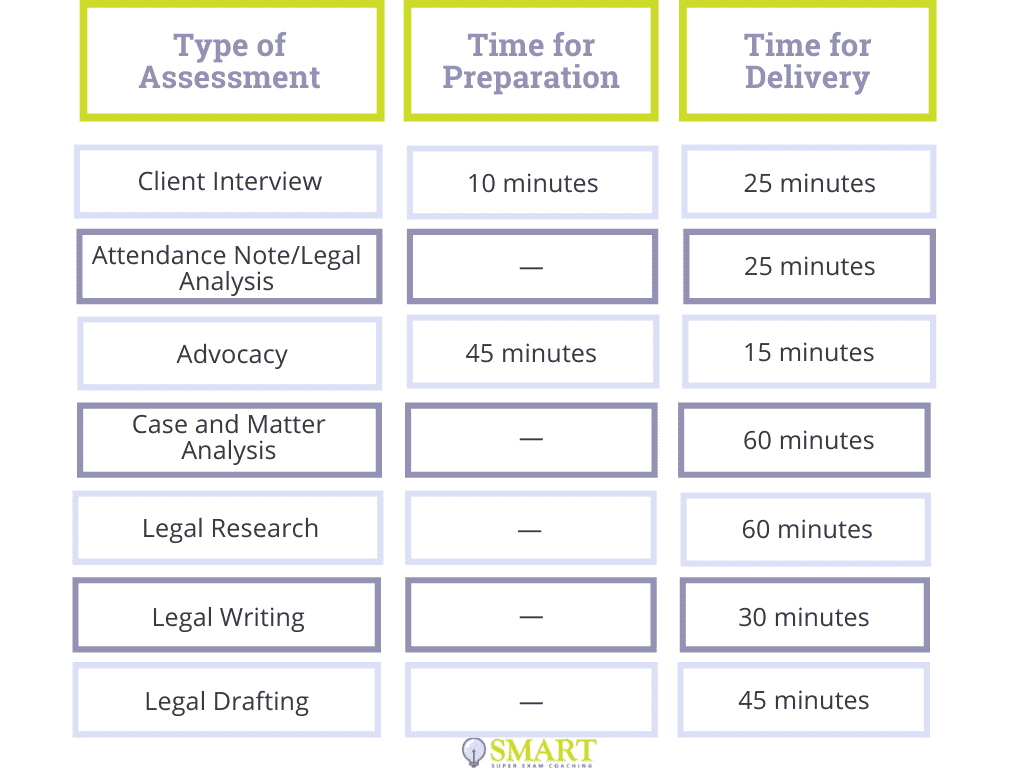
For seasoned lawyers with substantial work experience at law firms, navigating all these various professional activities within such strict time limits can be smooth and seamless. However, younger members of the legal profession, candidates without a law degree or foreign lawyers may face significant challenges – if not exposed to sufficient practice before sitting the law exam.
That brings us to perhaps the most crucial questions – what exam preparation strategy to rely on, and how to approach a search for SQE preparation courses and SQE 2 mocks.
SQE 2 preparation
We focus our SQE2 preparation on:
- 1-to-1 mock exams with tailored feedback from those who passed. You can find more details on our preparation approach at the link.
- focused notes for those who need to revise the law, which you can learn more about here.
If you’re a SQE resitter, we recommend reading our dedicated article on an effective SQE2 prep strategy for your next attempt. It can provide valuable insights to help you cut through the noise!
As you can hopefully see for yourself, your SQE 2 results will clearly depend on 3 factors:
- your knowledge of the law: substantive law combined with procedural law and ethics, which are integrated into functioning legal knowledge (FLK), and
- the level of experience you have with oral and written legal skills.
- understanding the exam tactics and marking
Building upon the knowledge gained in the course of SQE 1 preparation will surely contribute to your success with SQE 2. It is interesting, but according to the exam statistics released by the SRA, qualified foreign lawyers underperform compared to other candidates. This may be due to a substantially different approach to actual legal work and examination in other jurisdictions. We specialize in training foreign lawyers for the SQE2 exams. Many of our tutors are themselves foreign-qualified who have passed the SQE2 exam.
At the same time, being carried out through multiple choice questions, the Functioning Legal Knowledge assessment disregards the skills element. That means the SQE 2 skills that are outside the SQE 1 exam require thorough training. Based on that, one of the best ways to prepare for SQE stage 2 seems putting your knowledge and skills into practice.
Numerous experiments (learn more here: have clearly proved practice testing to be more effective in long-term retention of knowledge than spending the same amount of time on rereading:
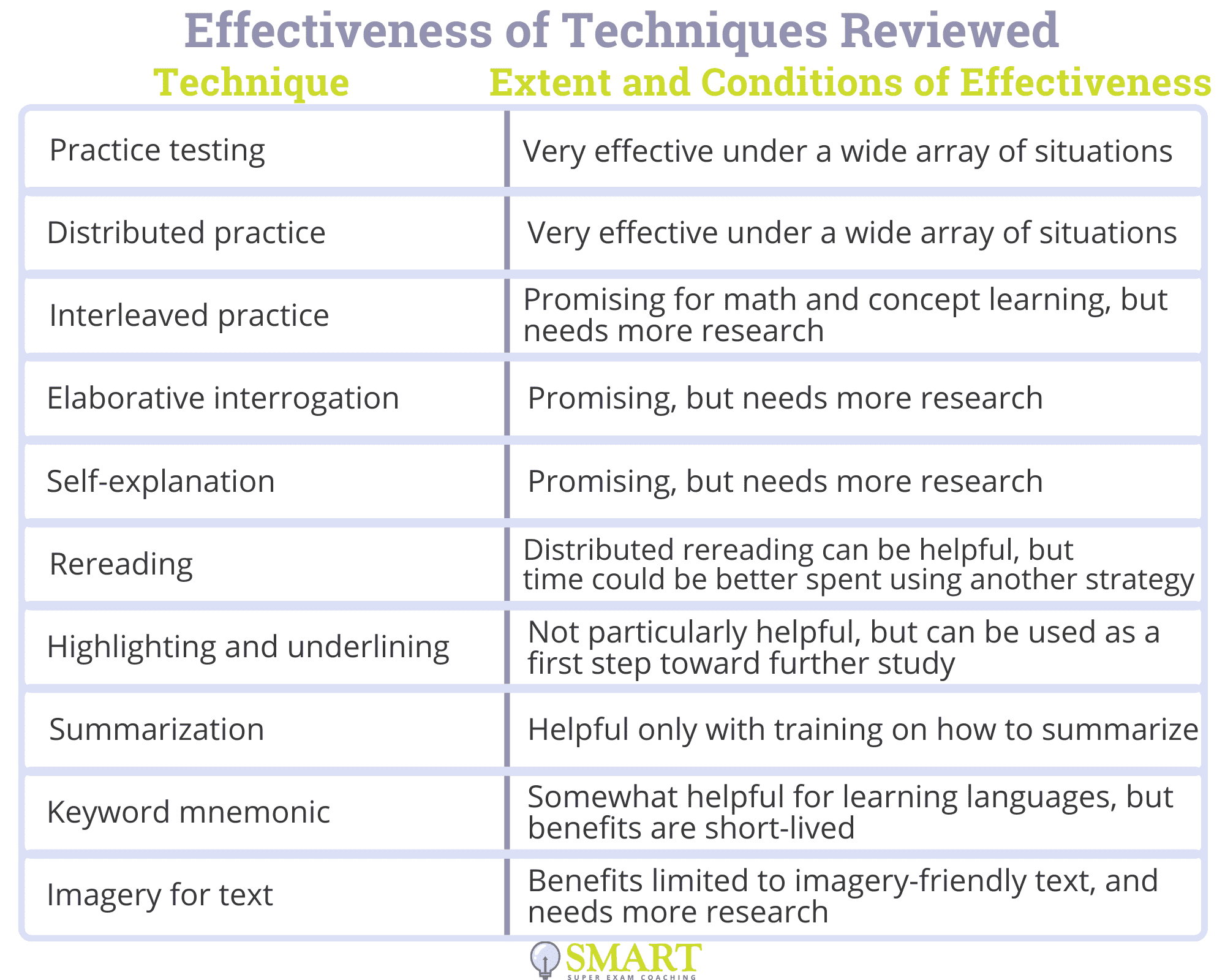
While students can generally benefit from any type of practice test, there are some particularly recommended to aspiring solicitors of England and Wales.
One possibility is self-testing – for example via flashcards. Flashcards are more effective because they require recall from memory, compared for example to multiple-choice tests which ask you to recognise the correct answer.
However, doing SQE2 prep through individual SQE 2 mocks puts your knowledge and skills into practice and can be one of the best ways to get through the SQE assessments – particularly, if carried out as part of your SQE preparation course, under the supervision of a knowledgeable and experienced mentor.
That’s exactly what we do – immerse our students, only one at a time, in real-time professionally designed simulations to test their knowledge of the law and develop their skills. More importantly, each SQE candidate receives an individual mark and feedback from the tutor. Through a combination of these two training modes, aspiring solicitors get a chance to:
- build, challenge and reinforce their knowledge,
- develop their skills and learn exam methodology, and
- interact with experienced professionals.
When choosing a strategy for the SQE2 preparation, it is important to consider the methodology of the assessment itself. As SQE Stage 2 is a practical legal skills assessment, successful preparation for it should also be based on practice. With this in mind, we have built up a SQE 2 preparation course that offers one-to-one mocks with individual feedback. Read more and purchase our SQE2 training here.
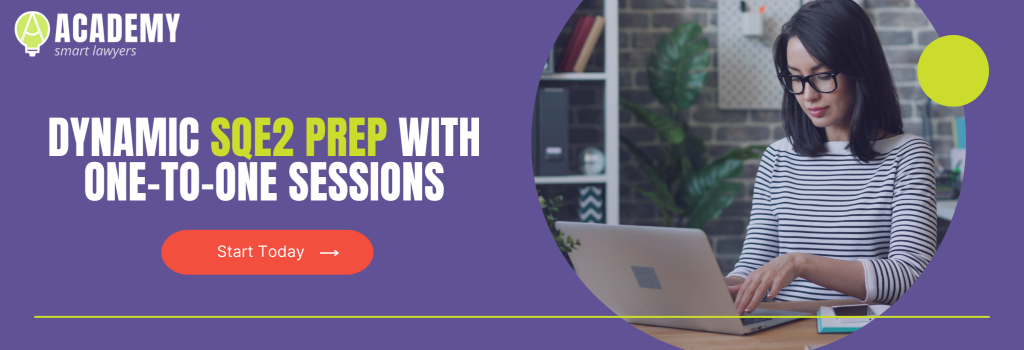
Your SQE 2 preparation course
Considering the approach to effective preparation for SQE two above, it seems logical to look for practice-based SQE2 prep courses and book SQE2 mocks. The key components of these courses should be individual mock sessions with one-to-one feedback provided by trained SQE tutors.
The core of our methodology is precisely 1-to-1 mock exams with tailored feedback from successful candidates. You don’t need to practice numerous SQE2 mocks; what you need are quality mock sessions with individualised feedback.
Our mock exams take place online on our own training platform, SUPEREXAM, which is highly flexible:
- You purchase what you need – SQE mock sessions, lectures or seminars – instead of fixed, unchangeable packages.
- There is a discount system when you top up your account to a certain amount.
Conducting mock client interviews and advocacy sessions within the framework of an SQE 2 preparation course will be beneficial for both your skills and knowledge in that it will:
- improve your interactive skills by engaging you in individual interactions with a client (in an interview) or a solicitor (in advocacy)
- involve you in legal fact-finding
- let you practice in forming and performing your negotiation strategy
- teach you to manage your time in SQE mock stations
- test your knowledge of the law and identify areas in need of revision.
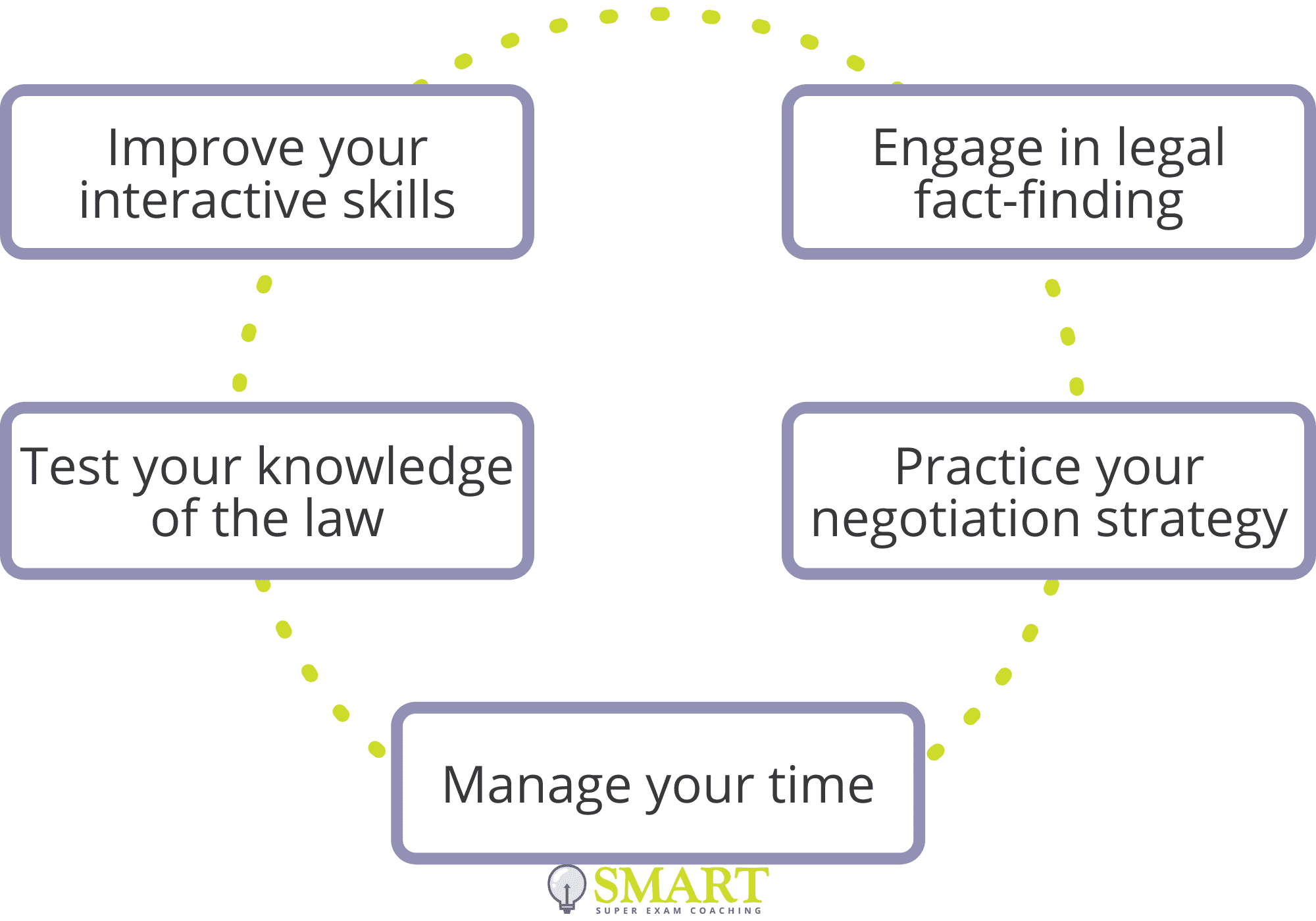
It will provide extra value to would-be solicitors if SQE 2 simulations (SQE2 mocks such as mock interviews and advocacy sessions) are conducted by mentors trained to give personalised student feedback.
That is especially true of mock advocacy stations: if your mock judge is a solicitor of England and Wales and at the same time a mentor familiar with the SQE methodology, she turns your mock station into an active and collaborative learning activity.
Likewise, in written SQE 2 assessments, it seems important to apply your knowledge to solving the problems set out in the instructions. That will help aspiring solicitors test their legal knowledge, check for gaps in it, and turn to focused revision.
None of the goals above can be accomplished if the superexam tasks are offered for self-assessment, if the tutor’s personalised feedback is substituted with suggested answers. On frequent occasions, we indeed receive requests from aspiring solicitors who have been given a task in legal writing, to provide them with a sample letter instead. This seems ineffective in skills training, not much different from rereading law books – which though being absolutely vital in building up knowledge, does not help with developing legal skills required for SQE 2.
At the same time, there’s no denying the value of knowing what to expect in the superexam – and that’s where sample SQE questions and answers may indeed come in handy. One such resource 2-assessment-specification/SQE 2-sample-questions/) is helpfully provided as part of the SQE 2 assessment specification by the Solicitors Regulation Authority (SRA) – in the open domain and free of charge.
Finally – getting back to SQE preparation сourses – a strong advantage would be the SQE 2 course provider’s experience in training law professionals for simulation-based examinations similar to the SQE two. That would imply access to the most precious assets of the SQE2 prep:
- the solicitors qualified in England and Wales who have expertise in simulation-based assessments,
- standardised clients trained to assess the client-facing skills of the lawyer, and
- effectively designed simulation scenarios and SQE2 mocks.
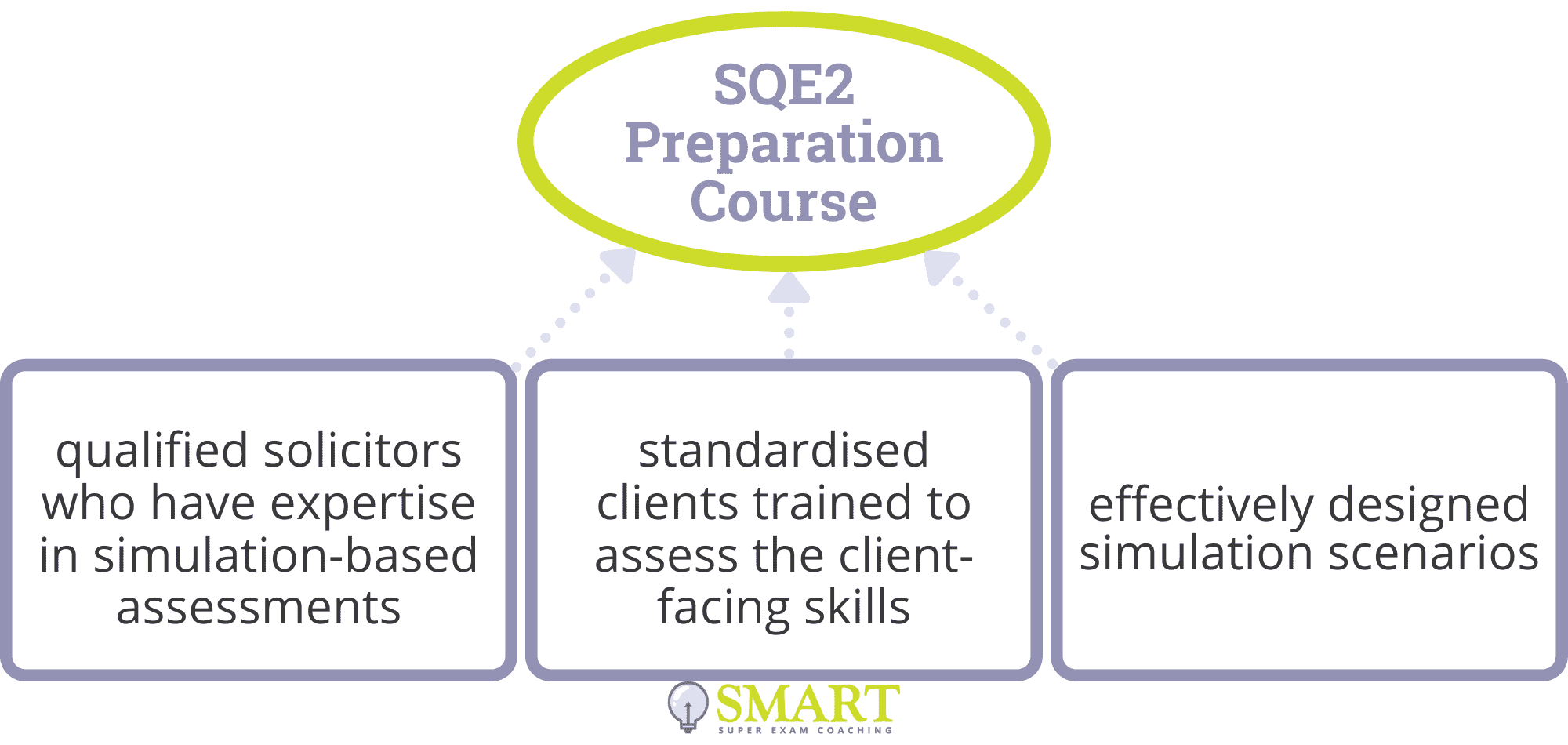
One such simulation-based exam is Part 2 of the Qualified Lawyers Transfer Scheme (QLTS) for foreign-qualified lawyers – called the Objective Structured Clinical Examination (OSCE). Its assessments make use of the same methodology and include oral and written tasks quite similar to those contained in the Superexam. By developing OSCE preparation courses, your SQE 2 training provider may have accumulated the tools and resources that you will benefit from throughout your SQE 2 online course.
The Academy of Smart Lawyers (also known as OSCEsmart) started in 2018 as a preparation course for the QLTS OSCE – and provided training for foreign-qualified lawyers seeking admission as solicitors of England and Wales. Having ourselves qualified via the QLTS bar exam, we have first-hand knowledge of the exam methodology and required standards, and our SQE2 programme helped hundreds of lawyers from all over the world get through the qualifying examination, both the OSCE and SQE2.
To see some of our testimonials, and hopefully to get a better understanding of our SQE2 course and how we can help you accomplish your goal of qualifying as a solicitor of England and Wales, please click here.
Sitting SQE 2
Solicitor Qualifying Exam was officially introduced by the SRA on 1 September 2021. Passing SQE 1 is the first step to qualify for the SQE 2 exam.
If you have already passed SQE1, your next opportunity to sit for the SQE2 exam will be in October 2024.
Geographically, centres for sitting written SQE 2 assessments will be available in England and Wales, as well as in some international locations. According to the SRA, the oral component of SQE two however will likely be assessed in a more limited number of venues. That means, the earlier you register an SQE account and start booking, the wider choice of SQE test centres you will have.
With that in mind, think smart, choose wise, and plan ahead! SQE2 prep is a long journey, and the only way to make it is by taking one small step at a time – slowly but surely.
What topics do I need to revise for the exam?
please guide me on how I can buy your SQE2 prep course